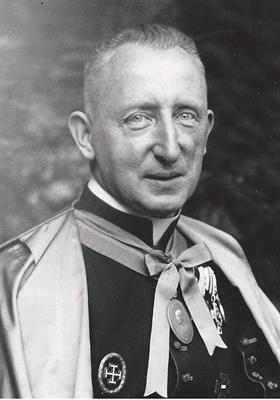Josef Engelbert Enzmann

Personalia
Born:
Died:
Profession:
Persecution:
Imprisonment 10.08.1938 - 02.03.1940,
Security money 1941,
Imprisonment 06.03.1945 - 06.04.1945
Memberships
Curriculum Vitae
Josef Engelbert Enzmann entered the seminary in Vienna after graduating from Hollabrunn grammar school and began his theological studies at the Catholic Theological Faculty of the University of Vienna.
In 1908, he was accepted into the student fraternity Amelungia. He was ordained a priest in Vienna in 1912 and then worked as a chaplain in Wolkersdorf and Stockerau. Until the end of the war, he worked as a field curate at the "Maria Hilf" convalescent home there.
After the First World War, Josef Engelbert Enzmann also studied political science at the University of Vienna. In 1929, he was appointed local provost at St. Johann Nepomuk in Breitenfurt, where he worked as a cooperator from 1937. He was then appointed Expositus of St. Josef in Breitenfurt.
Josef Engelbert Enzmann was involved in the CSP and also participated in local politics. In 1924, he was elected mayor of Breitenfurt. He held this office until 1933; he then resigned from office following a decision by the Austrian Bishops' Conference and was re-elected mayor in 1936 until the fall of Austria in 1938
During the invasion of the German Wehrmacht, Josef Engelbert Enzmann was dismissed as mayor on March 11, 1938 and is said to have been thrown into a cesspit by the local SA. He is interrogated on March 13. Following a complaint, he was arrested on August 10, 1938 and taken to the local gendarmerie, then initially sent to Liesing District Court as a prisoner on remand and later transferred to Vienna Regional Court until March 2, 1940. He was accused of mismanaging the municipal assets. He is therefore charged with abuse of authority. After his release, he returns to St. Joseph's as a pastor. At the request of the Vienna public prosecutor's office on June 24, 1941, the criminal proceedings initiated were dropped by court order on July 10, 1941.
Because he had "circumvented the legal provisions on the abolition of convent schools by enlisting nuns to teach extracurricular denominational lessons" - according to the official justification, he was sentenced to a fine of 1.
Shortly before the end of the war, he is arrested again on March 6, 1945 for "preparation for high treason" because he is accused of having had contact with the resistance movement. Due to the fighting for Vienna, he was released from the Vienna Rossauer Lände police prison on April 6, 1945. On June 14, 1947, at Josef Engelbert Enzmann's instigation, the body of his confederate brother Walter Caldonazzi, who had been executed by the Nazis, was transferred from the Central Cemetery to Breitenfurt for burial in the monastery cemetery. In 1975, the body was transferred to the family grave in Innsbruck.
Following the plans of architect Prof. Dr. Clemens Holzmeister, Josef Engelbert Enzmann was able to initiate the construction of the "lower church", which was to serve as the parish church of St. Boniface, but he did not live to see the foundation stone laid. The church was consecrated on June 13, 1970.
Places
Honoring:
Place of activity:
Citations
- Krause, Peter/Reinelt, Herbert/Schmitt, Helmut (2020): Farbe tragen, Farbe bekennen. Katholische Korporierte in Widerstand und Verfolgung. Teil 2. Kuhl, Manfred (ÖVfStG, Wien), p. 64/65.
Photo: ÖVfStg
